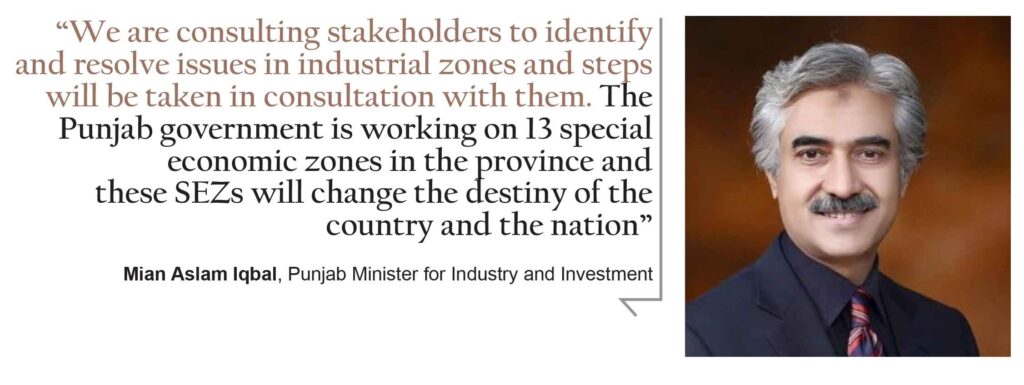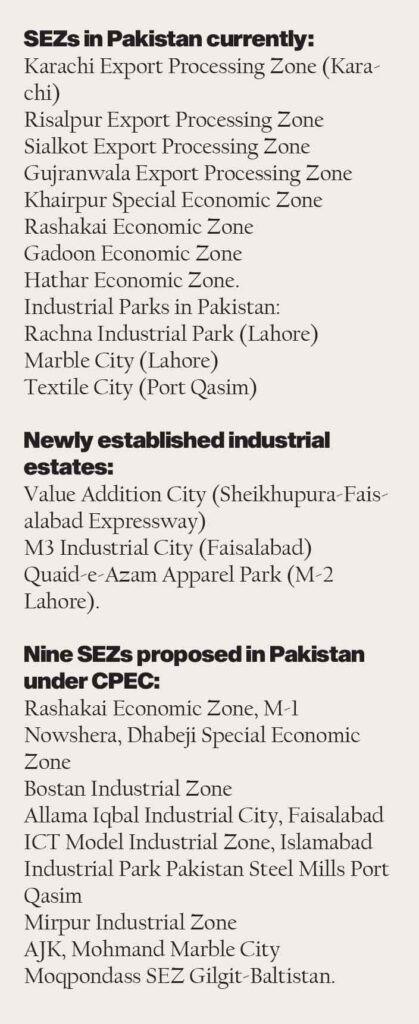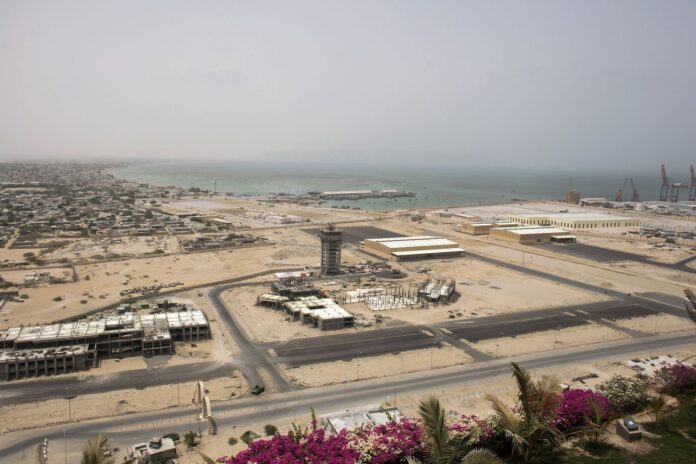The old American adge from the early 1990s, ‘It’s the economy stupid,’ holds true everywhere. Every modern government that has ever come into power has come with the express claim that they will fix the economy and as a result bring prosperity.
Pakistan is no different. The economy, after all, is simply the system through which a society structures how goods and services are consumed and provided. This is basic A level economics, but it is important to understand. Most places have strict rules by which the economy operates, but these rules are not always conducive to economic growth.
In Pakistan, one of the answers that many have touted as game changing are Special Economic Zones (SEZs). SEZs are designated areas in which the business and trade laws are different from the rest of the country. SEZs are located within a country’s national borders, and their aims include increased trade balance, employment, increased investment, job creation and effective administration.
Again, this is the textbook definition of SEZs. In Pakistan, the reason they are even more important are because they are at the center of the China Pakistan Economic Corridor (CPEC). The SEZs along CPEC routes and at crucial points, particularly in the North, not only have different laws, but have been massive undertakings in setting up infrastructure, housing, power, markets, communication systems, and anything else that might be needed to turn these SEZs into juggernauts of economic growth.
These SEZs are supposed to give Pakistan a new industrial identity, in which the country is supposed to stand side by side with Chinese companies to embark on exciting new economic activities in these zones. There are a number of opportunities available for Pakistan to capitalize on with these zones, especially in partnership with China, but there are also challenges in effectively managing the SEZs. Profit, takes a look.
SEZs in Pakistan
Every district of Pakistan has an industrial estate or area with infrastructure that offers a variety of benefits. In Punjab, there are 26 industrial estates, 30 in Sindh, seven in Balochistan and 12 in Khyber Pakhtunkhwa. The problem on evaluation, however, is that these estates are failing miserably. They have been badly placed in remote areas, and because there are no incentives to move there, a lack of skilled labour and basic facilities plagues these estates.
These estates were an early precursor to SEZs. Some of them have been more successful, mostly the ones in larger cities that have significant populations and facilities. Perhaps the best example is Sialkot, which is famous for its sports goods and surgical instruments. The reason Sialkot has become famous for these products is exactly because it is a special industrial estate. The same goes for Faisalabad and textiles and engineering related products in Gujranwala.

Now, SEZs are planning to improve on the industrial estates model. But this is not the first time that SEZs have tried to become a thing in Pakistan. The culture of import was first promoted in Pakistan early in the country’s history, with the 1960s being the first era where import was King. Then, in the 1980s, Pakistan finally turned its attention to export growth. The first SEZ in Pakistan was established in Karachi in 1983, and by 2005, the country had seven active SEZs.
However, despite the passage of time, these SEZs were not able to increase employment opportunities and exports as much as they should have. The biggest hindrance in their being more effective was political instability, since SEZs granted under one government were looked at suspiciously by the next government.
Add to this a poor law and order situation, unavailability of infrastructure and uninterrupted supply of electricity and lack of skilled manpower, and you had SEZs not really working out. Now, many of these issues have improved over the past decade. We have also overcome some of the major difficulties to the development of SEZs and steps are being taken to further improve the situation.
According to Dr. Suhail Saleem, who is CEO of the Punjab Board of Investment and Trade (PBIT), the latest effort to make SEZs a major driving force in the economy will be revolutionary because they are going to be based on public private partnerships.
Dr Saleem explained that the SEZ Act is not new, having been promulgated and also notified nearly a decade back in 2012. The law provides SEZs to be set up by the Federal or Provincial Governments themselves or in collaboration with the private sector under different modes of public-private partnership or exclusively through the private sector. The fiscal benefits under the SEZ law include a one-time exemption from custom duties and taxes for all capital goods imported into Pakistan for the development, operations and maintenance of a SEZ (both for the developer as well as for the zone enterprise) and exemption from all taxes on income for a period of ten years.
For any business looking to set up at low cost, this is a great deal. These SEZs according to the act need to be set up in an area of at least 50 acres, with no maximum limit. Similarly, the benefits for developers are one time custom duties exemption on plant and machinery and income tax exemption for five years. There is als a one time custom duties exemption on plant and machinery and an exemption of 10 years on income tax for units starting production by 2020.
However, one of the major problems has been that most investors have only recently become interested in investing in Pakistan. And according to the act, any businesses setting up before May of this year would get a 10 year tax exemption. However, for anyone setting up after, the tax exemption is only for five years. Most businesses do not even break even in five years, making the offer less attractive. It is for this reason that the government has recently amended the act to allow a 10 year income tax holiday for people investing even after 2020.
“This is clearly an attractive offer, and because of this, the private sector is really taking up the offer. We have been receiving applications, and various developers are coming here,” says Dr Saleem. “In the next few days, a private developer will also be declaring SEZ in the name of JW. Its total area is 230 acres while it has already completed two of the three stages of approval. Now all that is left is to get approval from the Prime Minister’s Secretariat.”

As Dr Saleem explains, the advantage of setting up a private sector industry in an SEZ is that on the one hand they will be able to avail all the facilities in the zone, and on the other hand, the private developer will also try to talk to foreign investors and establish foreign industries in their zones. “The result will be that while the government is making efforts for foreign investment, the private sector will also make efforts and a large investment will come to Pakistan,” he says.
“One of the biggest problems for foreign investors in Pakistan in the past has been land acquisition, which has been plagued by fraud. SEZs solve foreign investor land acquisition issues. If we talk about Allama Iqbal Industrial City, an acre is being sold there for RS 9.5 million and this land will also be available on installments.”
But this poses another problem. Should the government be trusting private sector industrialists to negotiate with foreign investors essentially on their behalf? After all, these local industrialists will have their own interest in mind, and rightfully so. What is stopping them from buying this land for SEZs and then selling it to investors at exorbitant rates? Because once the land is bought and registered as SEZ land, it will remain so, and the new buyer will get the benefits from it.
“Our goal is to promote industrialization in the country. Any investor who buys land in SEZ will have to start construction there in six months. However, no investor will be able to sell the land after buying it,” explains Dr Saleem. “Even if he has to sell, he will sell the whole industry or factory so that the business can continue. PBIT is playing an active role as a liaison between Federal BOI (Board of Approvals) and Industrial Estate Development Companies in Punjab and also assisting private developers to complete their application/proposal of Industrial Parks for the declaration as SEZ.”
Will these SEZs really be beneficial?
On paper, it sounds good, almost too good, which is perhaps why it is not surprising that there are some murmurings of discontent about how these SEZs will operate. One senior official of the Federal Board of Investment on the condition of anonymity told Profit that the establishment of SEZs would undoubtedly be beneficial, but would also pose a number of challenges for the government and policy makers to pay more attention.
“To reap the full benefits of SEZs, we need to transform our human, financial, technical and institutional resources. Similarly, location plays an important role in the success of any SEZ which should not be politicized. The location of the SEZs should be chosen in such a way that the industrialist can easily prepare, import, export and produce the raw material,” said the source.
“In fact, Pakistan’s human resources are not yet highly skilled at working in SEZs, nor is it fully familiar with the use of Chinese technical equipment and machines. Therefore, they may not be able to get the full employment opportunities created in these SEZs, which is why we hear such news that the important work in these SEZs will be done by Chinese labor,” they went on to say. “The government should also play a full role in teaching technical skills to the people here instead of making claims.”
The source went on to detail that it is essential to harmonize the policies of the Chinese SEZs and the SEZs here, and there is still a need to implement policies such as starting a business at a lower cost and facilitating business. In this regard, the government should formulate long-term policies and show consistency in them, while in order to achieve the objectives of the industries which have to increase exports in the SEZs.

“Our government agencies and departments are not yet fully experienced in managing these industrial zones and dealing with foreign investors and this attitude could be an obstacle in achieving the goals of SEZs. Therefore, the government should also work to enhance the capacity of the departments and agencies which are dealing with finance, economy and administration of SEZs, especially the all the Board of Investments of Pakistan. Technology is changing and accelerating day by day all over the world while we are still far behind in the race for technology. If we are to reap the benefits of foreign economies, we will have to increase the number of related and supply firms and shift appropriately sized industrial groups to SEZs.”
Syed Nabil Hashmi, who is the Chairman of Punjab Industrial Estates Development and Management Company (PIEDMC), is quite confident about the situation of SEZs in Punjab. Speaking to Profit, he informed about the development of SEZs in Punjab during the last two years.
“Recently, three of our industrial estates have been declared as SEZs, Bhalwal Industrial Estate, Rahim Yar Khan Industrial Estate & Vehari Industrial Estate. Similarly two of our industrial estates are already in process for SEZ declaration, Quaid-e-Azam Business Park (QABP) & Bahawalpur Industrial Estate respectively. However, development works have been initiated at Quaid-e-Azam Business Park & Bahawalpur Industrial Estate.”

Meanwhile Punjab Minister for Industry and Investment, Mian Aslam Iqbal, informed Profit that he has directed the development work in the industrial centers be completed quickly, \ and he is also liaising with the federal government to ensure that issues like electricity, gas and other issues in industrial estates can be resolved immediately.
“We are consulting stakeholders to identify and resolve issues in industrial zones and steps will be taken in consultation with them. The Punjab government is working on 13 special economic zones in the province and these SEZs will change the destiny of the country and the nation,” he said. “Billions of rupees are being invested in setting up new industries in industrial zones and establishment of industrial estates will create millions of jobs.”
“Quaid-e-Azam Business Park is a milestone in terms of industrial development. The industrial centers to be built on thousands of acres in South Punjab will bring an economic revolution in the region. I have also instructed PIEDMC to work actively for the speedy completion of the development work of the industrial estates.”
The sustainable solution to the economic and employment problems facing the country is the promotion of industrial and commercial activities, which will not only reduce the difficulties of the common man in terms of employment, but will also have a positive impact on the overall national economy. SEZs play an important role in the economic development of any country and if we are to benefit from them, it is important that there should be no bureaucratic hurdle for the development of SEZs and the ministries of all the provinces should work as a team to resolve all the issues in these SEZs.





































No amount of investment in SEZs will make a country industrial or increase the industrial output by a large margin. It can only be done through continuous investment on development of skilled human resources along with required training.